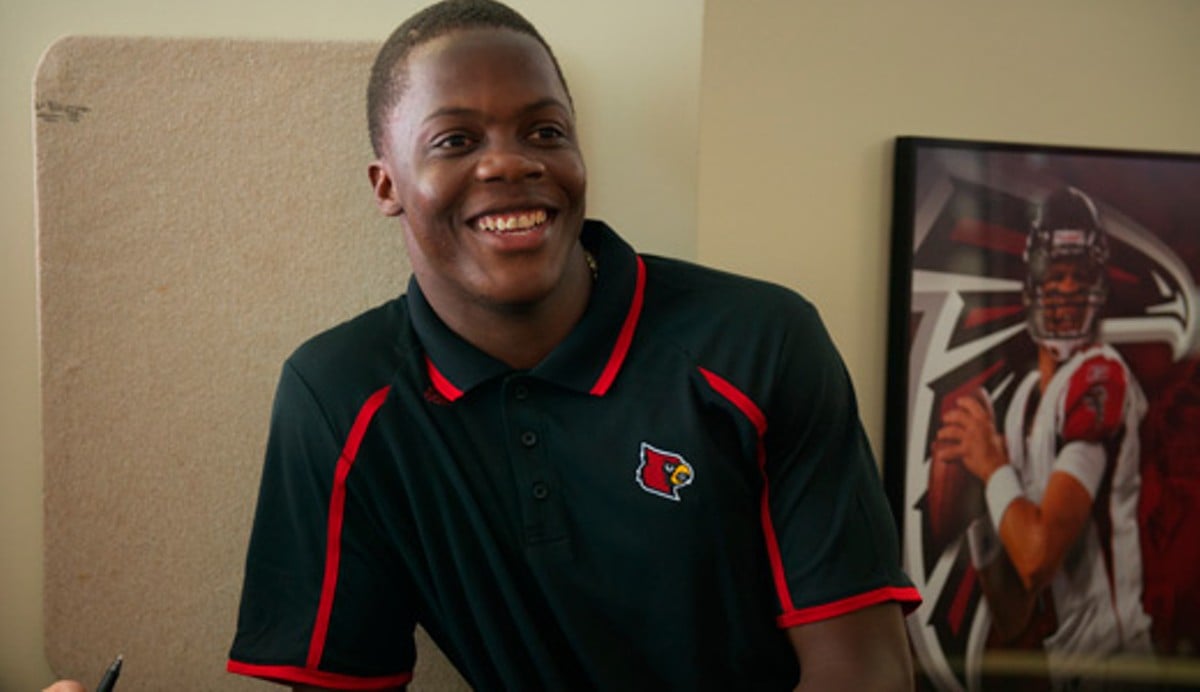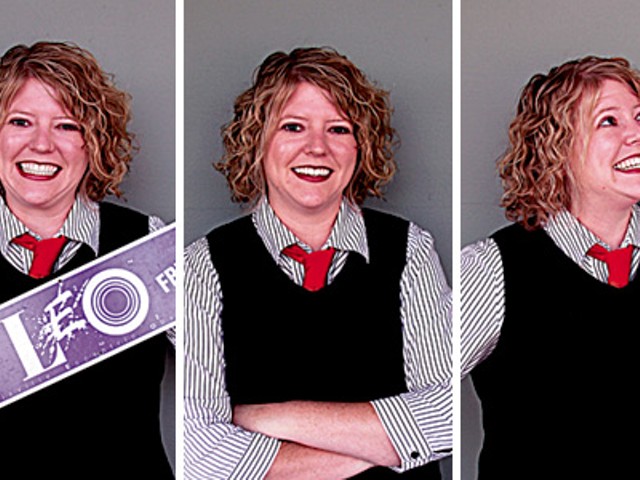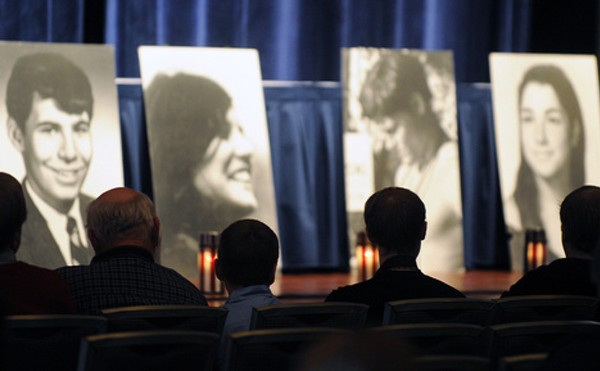Who says you can’t judge a book by looking at its cover?
Or a football team by looking at its players — as in the case of the University of Louisville Cardinals, who appear to be just as big, just as fast and maybe even more talented than any recent Louisville team, including last year’s bunch that finished 11-2, dusting itself off after a couple of league losses to lay a haymaker on Florida in the Sugar Bowl. A shot heard ’round the college football world.
That Louisville team was powered by sophomores and juniors who are now juniors and seniors, led again by quarterback Teddy Bridgewater. The Associated Press ranks Louisville No. 9 to start the season, and some observers think the Cardinals could rocket into another big BCS bowl and ruin another big-name team.
Maybe. Maybe not. Louisville kicks off the season Sunday at 3:30 p.m. against Ohio University in Papa John’s Cardinal Stadium, and by Dec. 5, when the Cardinals conclude the schedule with a likely cold-night game at Cincinnati (always tough), we’ll know if Louisville is still ranked on the BCS Times list of best-selling college football teams.
In the meantime, the most interesting facet of the Louisville football Cardinals isn’t the preseason hype, but the air of expectation among the players. They’re loose and happy, and seem ready to go. Not just the sure-handed receivers and cover-boy quarterback in the “skilled positions,” but throughout, a roster of players with skill. A cast of characters waiting to turn back the cover and find out what’s in the book — talking not so much about themselves, but about what they do, filling in the pages that tell the Louisville story.
And a good place to begin might be with the man who will touch the ball even before Teddy Bridgewater, center Jake Smith.
“There’s a lot of thinking in being an offensive lineman,” says Smith. “A lot of people think if they know the offense, they’ll be fine. But it’s not just about knowing the offenses — that’s a given. It’s really about knowing the defenses. It’s a big challenge that every team you face brings a different defense with different blitzes and different personnel every week. You have to understand the blitzes, the fronts, the coverages.”
Fans might notice the way today’s offensive lines don’t just break out of the huddle and take their stance, set in cement until the ball is snapped. They look around. Bob up and down. Bark signals among themselves even before Bridgewater begins his count. All in reaction to how they find the defense arrayed before them. The center is the Speaker of the House, with the gavel of final decision on how the line will block.
Then comes the explosion.
“You actually have to block people — that’s the hard part,” says Smith, with the grin of a guy named Jake. “Contrary to popular belief, blocking is not easy. It’s pretty hard. You’ve got somebody weighing 300 pounds running right at you, and you have to completely stop their force — while back-peddling. It’s tough. Not easy to block people.”
It helps to have size. Smith weighs in at more than 300 pounds, and some of his line mates are even bigger.
Like Abraham Garcia, a 6-foot-5, 347-pound sophomore from Ft. Lauderdale, Fla., who is bidding to start at right tackle. Garcia is better known as “Nacho,” a nickname tagged on him by a high school coach looking for something a little livelier than Abraham.
“I don’t mind being Nacho,” says Garcia, his face lining up in a wide-brimmed smile. “It’s a way for everybody to know me. It’s a catchy thing. It just sticks. In fact, it got so when they’d call me over the intercom, it would be not for Abraham Garcia, but, ‘Can you send Nacho up to the office, please?’”
Name recognition might go with the size of the name, too.
“It’s a great feeling to know that when you’re walking out there and you’re a big person that people automatically see you, and they have the automatic respect, ‘OK, this is a big monster of a guy, we got to look out for him.’”
All of which is fun, but Garcia brings a listener around to the real point of having size: “It’s our motto: Protect and win,” explains Garcia. “You protect, you win. You give Teddy time, he’s going to make the right throw. He’s the most accurate quarterback in the NCAA, I believe.”
A perfect example came in the first game of last season, right at the start, when a Kentucky kickoff pinned Louisville in a deep hole inside its own 10-yard line. A sizable Big Blue faction smelled Cardinal red blood and was howling for it.
But the Louisville line gave Bridgewater the time he needed. Split end Damian Copeland took two or three strides down the right sideline, planted his right foot at the first down marker, and leaned low into the field. And there was Bridgewater’s pass hummed in on a low line where only Copeland could catch it. And he did.
A great way to start the season.
On other days, Bridgewater finds other receivers. DeVante Parker, who skies high for passes and scores the most touchdowns, might make All-American. But there’s a whole raft of pass catchers who seem to take their cue from Bridgewater. “If he can come in with a perfect pass,” they think, “the least I can do is catch it.” And they do.
“You give him enough time, he’ll kill the defense,” says Garcia, admiringly. “Teddy picks defenses apart. He can read everything. He’ll be able to put the ball anywhere. Give him the time, and he’ll do it.”
And about that “protect” part, nowhere is it more crucial than where Javon Brown lines up at the Secret Service position — or its football equivalent, left tackle. In pro football, left tackle is a premium pay position because that’s the guy who has a right-handed quarterback’s back. And Brown knows his job is to protect the right-handed Louisville franchise, Teddy Bridgewater.
“Going into games, I know I’m going to face the best pass rusher on the opposing team,” says Brown, a Louisvillian who switches from right tackle to left this season. “Just seeing everything from the left side is different from the right side where I played last season. So I have to keep working on technique. Always working on technique.”
Work is a major theme for everybody on this team. Of course, work is an easy word to say, and every football player in the country seems able to slip it into every sentence. But one gets the idea Louisville’s players have spent enough dreary winter days in the weight room and hot afternoons on the practice field that they’re allowed to mention the word a few times.
If he played on an opposing team, defensive end Lorenzo Mauldin would be the very desperado Brown is desperate to stop — the top pass rusher.
“I know if I hit the gap the right way, and if I feel myself open and I can see the quarterback — and if nobody’s back there with the quarterback — I know I got him,” says Mauldin.
A serious fellow, and a pretty tough-looking customer, Mauldin stands about 6-5 and 243 pounds, with not a quarter inch of fat on him — topped out with gold-tinted dreadlocks. You can believe he does relish catching a quarterback, but he says it’s running till it hurts that helps defensive linemen gather themselves up to do something that can turn a game around.
“See, with running, well, Coach (Sherrone) Moore puts us through, like, a simulation drill,” Mauldin says. “He runs us through 20 all-out sprints, and he’ll say, ‘OK, you’ve got two more. If you guys run these as hard as you possibly can, this’ll be your last two. But if I see any of you guys pull up, then you’ve got to run four more.’ So all of us run the last two as fast as we possibly can, because you know we don’t want to run more.
“That’s what I feel like when we pull out a game in the last minute,” continues Mauldin, visualizing the last desperate moments of a tight game. “In the fourth quarter. On third-and-one. When we really need to hold those inches — that’s when we pull out something we never knew we had.”
In Louisville’s Sugar Bowl victory, Mauldin didn’t catch the Florida quarterback on the dramatic first play from scrimmage, but he was all-out trying — as Louisville’s pressure created an interception by safety Terell Floyd, who ran the ball in for a touchdown, setting an emphatic tone for the Cards’ 33-23 Sugar Bowl victory.
“We knew the first play was going to be a pass,” says Mauldin. “We learned that in practice. We’d been watching Florida for a while. All I was doing was going through my assignment, rushing off the edge. The next thing I know, I’m off the edge. I’m getting really close to the quarterback. The ball is tipped and T. Floyd catches the ball. I’m, like, ‘Oh! I need to find somebody to block.’ But wasn’t anybody blocking for T. Floyd because he was so fast into the end zone.”
Right next door to Mauldin on the defensive line is Brandon Dunn, who also remembers where he was when Louisville knocked Florida off the block on the first play of the Sugar Bowl.
“Coach had been saying we want to really get after Florida from the start,” says Dunn, a senior from Louisville. “All he was saying was, ‘Go-go-go, fast-fast-fast.’
“So we were ready to go on that first play,” Dunn continues. “The center snapped the ball, and the next thing I looked up and T. Floyd had the ball and was running into the end zone! I didn’t even know how it happened. But we were ready, and it took off from there.”
If Louisville has any name stars on defense, it would probably be safeties Calvin Pryor and Hakeem Smith. Safeties are hard guys who make tackles but also cover receivers. So they’ve got big chances to snag a pass or come up with a fumble, and thence cover themselves in glory. Lonely cornerbacks, tasked with matching the speed of speedy pass catchers, also have open-field chances, but when they make a mistake … uh-oh. Everybody sees it.
Two years ago, Louisville’s cornerbacks were mostly raw rookies who too often found themselves holding the bag as opposing receivers got clean away. But Coach Charlie Strong issued a simple challenge to his beleaguered backs: “You guys say you’re fast. Go cover somebody.” And over that season and last, the cornerback crew has done just that. Now it’s pretty hard to pass against Louisville.
But not so difficult to run. Many observers feel Louisville’s biggest weakness is stopping runners.
A guy with something to say about improving the run defense is linebacker George Durant, who makes no promises, but notes that experience is also on the side of the run defenders. Plus, recruiting has added some new hands. And where Louisville played things conservatively last season on defense, look for the Cards to take it to opponents more this year.
It’s a team identity, says Durant. “We call ourselves the Red Swarm: red jerseys, all 11 hats to the ball. That’s what we hang our hat on, everybody flying around.”
Which could improve the defenders’ highlight reel selections. Hasn’t been much Red Swarm on TV. “You have to put your head down and work,” says Durant. “It’s not always what you see on TV. But you know it, the coaches know it, the players know it. Everybody that matters.”
Ultimately, though, the star of the show is Bridgewater. Now a junior, with a completion percentage that … well, let’s just say when he misses his target, fans suspect he did it on purpose. Bridgewater passed for 3,718 yards and 27 touchdowns last season — and did it with style. A cerebral presence, with a high-velocity arm. After Louisville grabbed that interception touchdown on the first play of the Sugar Bowl, Bridgewater coolly conducted the rest of the game like a football symphony.
Three years ago, Strong and staff found Bridgewater already a coming star at Miami Northwestern High and launched into a recruiting effort that ultimately lured the quarterback a thousand miles north.
“One of the first things I did when I got to Louisville was study the great quarterbacks they’ve had here,” Bridgewater noted a couple seasons ago. “In the football complex, their pictures are up on the wall and I would walk along and read what it said about them. Think about what they did.”
Bridgewater could earn tremendous fame if he could win the Heisman Trophy, which is awarded by the Downtown Athletic Club, in New York, to college football’s top player. And he will certainly earn big bucks playing pro football. He’s projected as the No. 1 or 2 pick in the 2014 NFL draft.
Naturally, all that stuff is in Bridgewater’s mind. Would have to be. As would be an undefeated season, a high national ranking and a bid to a big bowl. But right now, Bridgewater is taking football’s First Amendment, declaring he and his team are “taking it one game at a time.”
Of course that’s what they all say. But Bridgewater is one of those guys who probably means it. He probably does think about one game at a time. In part because he values the games — and maybe sees college football flashing by almost too quickly.
“It happened so fast,” Bridgewater says. “When you’re a freshman, Coach Strong always talks about looking back at the back row. When you’re a freshman, you sit on the back row at team meetings. He just reminds us how fast, how soon we’ll be on the front row as an upperclassman. Time has just gone by so fast.”
On Tuesday, Lorenzo Mauldin was injured in a hit-and-run accident. As of presstime, it’s unclear whether he’ll play Sunday. LEO wishes him the best.
Herbstreit talks football at Parklands Kick-off Luncheon
ESPN football analyst and “College GameDay” panelist Kirk Herbstreit appeared as the featured speaker at the Parklands of Floyds Fork Kick-off Luncheon last Thursday. In a program moderated by ESPN 680 radio personality Drew Deener, Herbstreit focused on the upcoming season’s prospects for U of L and Heisman Trophy candidate Teddy Bridgewater. He also talked with a capacity crowd of 300 about the fortunes of Kentucky (he likes new coach Mark Stoops, but thinks Stoops will need maybe three years to recruit the talent needed to win in the SEC), Notre Dame (tough schedule, 8-4 at best) and Mississippi (a team on the rise).
Herbstreit, a former Ohio State quarterback, also discussed a new tackling rule aimed at player safety, and proposals to provide a stipend for college players. He’s in favor of maybe $400 a month for kids of no means who find themselves away from home, in college, with absolutely no money.
Here are some highlights:
Q: Why was it such a shock when Louisville upset Florida in the Sugar Bowl?
A: If you’re a fan of your team, you think they can beat the New England Patriots. But if you’re not a fan of that team and you’re just objectively looking at it, there wasn’t one person outside of the Louisville fan base that thought they could win that game — but they did it! Congratulations, and now we’ll see what they can do this year.
Q: Your “College GameDay” partners picked Ohio State quarterback Braxton Miller, Texas A&M qb Johnny Manziel, and Oregon qb Marcus Mariota to win the Heisman Trophy.
A: I picked Teddy Bridgewater. With the Heisman, a lot of who wins has to do with their team having a lot of success, and the quarterback putting up a lot of numbers. When you look at Louisville’s schedule, it’s hard to imagine them not winning every game. Teddy’s going to put up some very good numbers, so I think at the very least he’s in New York (the night the winner is announced at the Downtown Athletic Club). And also I think he’s a great pro prospect, getting ready for the next step. Teddy’s just a breath of fresh air to talk to, a down-to-earth guy, an outstanding young man.
Q: Louisville’s chances of playing in the BCS championship bowl?
A: To be candid in front of a lot of Louisville fans, I like them from the outside looking in — in the same way I liked Boise State, from the outside looking in at the traditional powers. I’m not saying it’s right. I’m just telling you the way it is … Remember what the BCS is about: It’s about how the coaches vote, how the polls vote and how the computer votes. That’s why the ACC is such a good fit for you guys. Then, if you win the ACC, you’re in.






